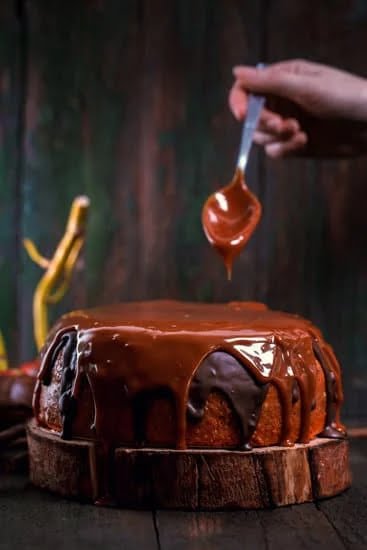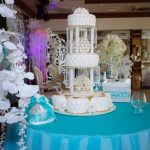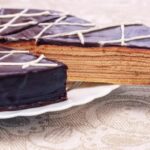Baptism is a significant milestone in many religious traditions, symbolizing the initiation of someone into their faith. It is a joyous occasion that brings families and communities together to celebrate this important moment. And what better way to celebrate than with a beautifully decorated baptism cake? The art of baptism cake decoration holds great importance in these celebrations, as it not only adds an aesthetic touch but also conveys the spiritual significance of the event.
Baptism cakes have long been a beloved tradition, representing purity and new beginnings. They often take center stage at post-baptism gatherings, where loved ones gather to honor and commemorate this special occasion. The design and decoration of the cake can tell a story or hold meaning associated with the family’s faith or cultural traditions.
A well-decorated baptism cake serves as a visual representation of the love, joy, and hope that surrounds this momentous event. It becomes a cherished part of the celebration and creates lasting memories for both the child being baptized and their loved ones.
Whether you choose a traditional design or opt for more modern trends, investing time and effort into creating a beautifully decorated baptism cake is an expression of love and devotion that will be appreciated by all who partake in this sacred ceremony.
Traditional Baptism Cake Designs
When it comes to baptism cake designs, traditional styles are always a popular choice. These classic designs embrace the solemnity and joy of the occasion while creating a visually stunning centerpiece for the celebration. Here are some traditional baptism cake ideas that never go out of style:
- Cross Cakes: The cross is a powerful symbol in Christianity, making it a fitting design element for a baptism cake. Whether you choose a simple upright cross or an ornate Celtic cross, this design instantly communicates the religious significance of the event. Consider using white fondant or buttercream frosting to create a clean and elegant look, or decorate the cross with delicate piping and edible pearls for added detail.
- White Dress Cakes: Another traditional option is to incorporate motifs reminiscent of white christening gowns into the cake design. This can be done by creating cascading ruffles down the side of the cake to mimic fabric, or by using edible lace appliques to replicate intricate dress patterns. Accentuate this design with touches of pale pink or blue for a feminine or masculine touch.
- Heavenly Choir Cakes: If you’re looking for a more whimsical take on traditional baptism cake designs, consider incorporating angelic figures into your creation. You can use small figurines made from sugar paste or marzipan as cake toppers, or opt for 2D or 3D depictions of angels in icing. Adding heavenly choir elements such as musical notes or sheet music can also help enhance this theme.
To achieve picture-perfect traditional baptism cakes, here are some tips:
- Use templates: To achieve uniformity and accuracy in your decorations, consider using templates when piping intricate details like crosses and lace patterns.
- Practice piping techniques: Piping skills play a crucial role in achieving stunning designs, especially when working with delicate lace patterns or intricate detailing on crosses.
- Keep it neat: Traditional baptism cakes often involve clean lines and minimalistic designs. Make sure your piping and fondant work is precise and clean to achieve a polished look.
- Add delicate embellishments: Consider adding subtle embellishments like edible pearls, shimmer dust, or lace trim to add elegance and sophistication.
By mastering these traditional designs and techniques, you can create stunning baptism cakes that capture the essence of this important milestone.
Modern Baptism Cake Trends
In recent years, there has been a shift towards modern and unique designs in baptism cake decorating. This section will explore some of the current trends that are popular in creating a visually stunning and contemporary baptism cake.
Geometric Patterns
One of the notable trends in modern baptism cake decoration is the use of geometric patterns. This style adds a touch of sophistication and elegance to the cake design. Try incorporating geometric shapes such as triangles, hexagons, or chevron patterns into the cake. These patterns can be achieved using fondant cutouts or by piping royal icing.
Ombre Effects
Another popular trend seen in modern baptism cakes is the use of ombre effects. Ombre refers to a graduated color scheme where one color blends seamlessly into another. This creates a beautiful transition from light to dark shades. To incorporate this trend into your baptism cake, consider using different shades of one color for each layer or tier of the cake.
Textured Designs
Textured designs are also gaining popularity in modern baptism cake decoration. Adding texture can give depth and visual interest to the overall design. Consider using techniques such as ruffles, pleats, or textured fondant mats to create unique textures on the surface of the cake. Texture can be added to specific areas of the cake or used throughout for a more uniform look.
Overall, modern baptism cake trends embrace creativity and individuality, allowing you to personalize your cake for this special occasion. By incorporating elements like geometric patterns, ombre effects, and textured designs, you can create a contemporary masterpiece that will impress both visually and taste-wise.
Choosing the Right Colors for Baptism Cakes
Choosing the right colors for baptism cakes is an important aspect of cake decoration. The colors chosen should match the theme or gender of the baptism, and they contribute to creating an elegant and harmonious cake design. Here are some suggestions to help you select the perfect colors for your baptism cake.
Matching the Theme or Gender
When choosing colors for a baptism cake, it is essential to consider the theme or gender of the event. If there is a specific theme, such as a nature-inspired baptism, incorporating earthy tones like greens and browns can create a beautiful and cohesive look.
For traditional boy baptisms, shades of blue are commonly used, while soft pinks are popular for girl baptisms. However, it’s worth noting that these traditional color associations are not strict rules and can be deviated from depending on personal preference.
Creating Elegant Color Combinations
To achieve an elegant and harmonious look, consider using color combinations that complement each other. Some classic options include pairing light pastels with cream or white tones for a soft and delicate feel. Alternatively, contrasting colors can also create a visually striking effect when done purposefully. For example, combining deep purples with golden accents adds depth and richness to the overall design.
Adding Accents and Details
In addition to primary colors, incorporating accent colors and details can enhance the overall aesthetic of the baptism cake. Metallic tones like gold or silver can be used as elegant accents to elevate the design. Adding colored sugar crystals or edible flowers in complementary hues can also contribute to a more intricate and visually appealing cake.
Remember that while selecting colors is important for aesthetics, it is equally vital to respect any religious or cultural considerations associated with the baptism ceremony. By carefully choosing color combinations that align with these factors and considering personal preferences, you can create a visually stunning cake that perfectly suits both the occasion and the individual being baptized.
Incorporating Religious Symbols into Baptism Cakes
When it comes to decorating a baptism cake, incorporating religious symbols can add a meaningful and spiritual touch. These symbols not only enhance the design but also celebrate the significance of the sacrament. Here are some popular religious symbols that you can incorporate into your baptism cake designs:
- Cross: The cross is perhaps the most iconic religious symbol associated with Christianity. It represents Jesus Christ’s sacrifice and redemption. You can create a cross on the cake using various techniques such as piping, fondant cutouts, or even edible decorations like chocolate or sugar.
- Doves: Doves symbolize peace and the Holy Spirit in many Christian traditions. They are often associated with baptism as they represent the cleansing of sins and new beginnings. You can use dove-shaped molds or create them with white fondant or marzipan to place on top of your baptism cake.
- Angels: Angels have a significant role in Christianity as messengers from God. They symbolize protection, guidance, and divine presence during important moments such as baptism. You can include angel figurines or create angel wings out of fondant to adorn your cake.
- Ichthys (Fish): The fish symbolizes Jesus Christ in early Christian art and is still used today as a representation of faith in many Christian denominations. You can create fish shapes using piped icing or fondant cutouts to decorate your baptism cake.
- Water: Water plays a crucial role in the sacrament of baptism, representing purification and rebirth. Incorporating water elements into your cake design can be done by using blue edible decorations or creating realistic water droplets with gel icing.
To incorporate these religious symbols into your baptism cake design, consider using different decorating techniques such as:
- Piping: Use royal icing to pipe intricate designs like crosses, doves, or angels onto your cake.
- Fondant Cutouts: Roll out fondant and cut out shapes of religious symbols using cookie cutters or templates.
- Edible Decorations: Use edible decorations like sugar or chocolate molds to create three-dimensional symbols such as crosses or doves.
By incorporating these religious symbols into your baptism cake, you can create a visually stunning and spiritually significant centerpiece for your celebration. Remember to consider the size and style of the cake when choosing which symbols to include, ensuring they complement the overall design.
Personalized and Customized Baptism Cakes
When it comes to celebrating a baptism, personalized and customized cakes add a special touch that can truly make the occasion memorable. Personalizing a baptism cake allows you to incorporate specific details and symbols that hold significance to the family, making it a meaningful centerpiece for the celebration. Here are some ideas for adding those personal touches to your baptism cake.
One way to personalize a baptism cake is by including the baby’s name or initials. Using letter cutters or piping techniques, you can spell out their name or create monograms on the cake surface. This not only adds a personal touch but also serves as a keepsake for the family.
Including significant dates in the design is another way to personalize a baptism cake. You can incorporate the date of the baptism itself, or choose to include other important dates such as birthdays or anniversaries. This addition not only adds sentimental value but also acts as a reminder of the important milestones in the baby’s life.
Religious symbols hold great significance in baptism ceremonies. Incorporating symbols like crosses, doves, or angels into the cake design is a beautiful way to reflect the religious aspect of this celebration. You can use fondant or buttercream frosting to create these symbols and place them strategically on the cake.
Remember that personalizing and customizing your baptism cake should be a reflection of your own style and preferences. Whether it’s through intricate designs, unique color choices, or specially crafted fondant decorations, think about what resonates with you and your family. Let your creativity shine through while keeping in mind what will make this moment extra special for all those involved.
Overall, when it comes to personalized and customized baptism cakes, there are countless opportunities to get creative and showcase your individuality through cake decoration. Taking into consideration names, dates, religious symbols, and personal aesthetic preferences will result in a truly one-of-a-kind masterpiece that will not only impress but also hold deep meaning for the family.
Fondant vs. Buttercream
When it comes to decorating a baptism cake, choosing the right frosting is crucial. The frosting not only serves as the canvas for your design but also affects the taste and texture of the cake. Two popular choices for baptism cake decoration are fondant and buttercream frostings. Each has its own unique characteristics and it’s important to understand the differences in order to make an informed decision.
Fondant is a smooth and pliable icing that is rolled out and draped over the cake. It provides a flawless, polished look that is often associated with elegant and formal occasions like baptisms. Fondant can be shaped, molded, and even painted to create intricate designs and details. While fondant gives cakes a clean and professional finish, some people find it too sweet or chewy when eaten.
On the other hand, buttercream frosting is made from butter, powdered sugar, and flavorings like vanilla or almond extract. It has a rich, creamy texture that many find deliciously irresistible. Buttercream is versatile; it can be used to create simple or elaborate designs on cakes, making it suitable for both traditional and modern styles of baptism cakes. However, because buttercream is more delicate than fondant, it may be more challenging to achieve a perfectly smooth surface.
| Fondant | Buttercream |
|---|---|
| Smooth and polished appearance | Rich and creamy taste |
| Can be shaped or molded into intricate designs | Versatile for creating simple or elaborate decorations |
| May be too sweet or chewy for some | Deliciously irresistible but more delicate |
Ultimately, the choice between fondant and buttercream frosting depends on personal preference and the desired style of the baptism cake. If you prioritize a pristine and formal look with intricate details, fondant may be the way to go. On the other hand, if you value taste and enjoy a creamy texture, buttercream could be your best option. It’s also worth considering the climate you live in, as fondant can be affected by humidity while buttercream is more stable.
Regardless of your choice, both fondant and buttercream can yield stunning baptism cakes when paired with the right decorating techniques. So go ahead and let your creativity flow as you choose the perfect frosting for your special occasion.
Tips and tricks for beginners interested in Baptism Cake Decorating
Baptism cake decorating can be a fun and rewarding activity, especially for beginners who are just starting out. Whether you have a natural talent for baking or you’re simply looking to explore your creative side, here are some tips and tricks to help you get started on your journey to creating beautiful baptism cakes.
- Start with the basics: Before diving into more complex designs, it’s important to master the foundational techniques of cake decorating. This includes learning how to level and stack cakes, properly apply frosting, and handle piping bags. There are many online tutorials and instructional videos available that can guide you through these essential skills.
- Invest in quality tools: While it’s certainly possible to create stunning cakes with basic supplies, investing in quality tools can greatly enhance your cake decorating experience. Consider purchasing a good set of piping tips, a turntable for easy rotating while frosting, offset spatulas for smooth finishes, and food coloring gels for vibrant colors.
- Practice piping skills: Piping is an essential skill in cake decorating and there are many different techniques to explore. Practice piping various shapes and patterns on parchment paper or wax paper before attempting them on your actual cake. This will help you gain confidence and improve your precision.
- Experiment with different textures: Texture can add depth and visual interest to your baptism cakes. Try using different types of piping tips or experimenting with textured rolling pins or stencils to create unique designs.
- Don’t be afraid to make mistakes: Remember that everyone makes mistakes when they’re first starting out with cake decorating. Embrace the learning process and view each mistake as an opportunity to grow and improve. The more you practice, the better you’ll become.
- Get inspiration from others: There are countless sources of inspiration for baptism cake decoration available online and in books or magazines. Browse through social media platforms like Pinterest or Instagram for ideas on designs, colors, and decorations that resonate with you. Don’t be afraid to put your own spin on existing designs to make them truly personalized.
- Have fun and be creative: Cake decorating is an art form that allows for endless creativity. Don’t be afraid to think outside the box and try new things. Experiment with different color combinations, decorations, and flavors to create a cake that truly reflects your personal style and vision.
Remember, the most important thing is to have fun and enjoy the process of creating a beautiful baptism cake. With practice and patience, you’ll develop your own unique style and techniques that will continue to evolve over time.
Conclusion
In conclusion, baptism cake decoration is an important aspect of celebrating this significant milestone in a person’s life. Whether you choose a traditional design or opt for a more modern and creative approach, the beauty of the cake can truly enhance the overall ambiance of the event. By selecting the right colors, incorporating religious symbols, personalizing the cake, and choosing the appropriate frosting, you can create a stunning centerpiece that will be remembered for years to come.
Throughout this article, we have explored various ideas and techniques for baptism cake decoration. Traditional designs such as cross cakes and white dress cakes provide a timeless elegance that can be achieved with careful attention to detail. On the other hand, modern trends like geometric patterns and ombre effects offer unique and creative options for those looking to make a statement with their cake.
Choosing the right colors is essential for creating an elegant and harmonious cake design. By matching the theme or gender of the baptism, you can create a cohesive look that ties everything together. Incorporating religious symbols into the cake design adds depth and meaning to the celebration. Whether it’s doves, angels, or crosses, these symbols can be created using different cake decorating techniques.
Personalization is key when it comes to baptism cakes. Adding names, dates or specific religious symbols that hold significance to your family will make the cake truly meaningful. When it comes to frosting choices, fondant and buttercream each have their own advantages and appeal. Consider your desired design aesthetic and level of expertise before making your decision.
For those interested in trying their hand at baptism cake decoration, there are plenty of tips and tricks to help beginners succeed. With easy-to-follow techniques and advice on tools and supplies needed for success, anyone can create a beautiful baptism cake with practice and determination.
Frequently Asked Questions
Do you have a cake for a baptism?
Having a cake for a baptism celebration is a common tradition in many cultures and religious denominations. While it is not mandatory to have a cake, it serves as a festive centerpiece during the post-baptism reception.
The act of cutting and sharing the cake reinforces the sense of community and celebration among family and friends gathered to commemorate this important religious milestone.
What type of cake is best for christening?
When choosing a cake for a christening or baptism, it is best to opt for something simple yet elegant. Many people choose classic flavors like vanilla or chocolate, as they tend to be universally enjoyed.
The design of the cake should reflect the significance of the occasion by incorporating elements such as crosses, angels, doves, or biblical symbols. It’s essential to consider any dietary restrictions or preferences of those attending the event when selecting flavors and fillings.
What is the symbol on a baptism cake?
The symbol most commonly found on a baptism cake is the cross. The cross represents Christ’s sacrifice and his role as savior in Christianity. It serves as a powerful reminder of the central beliefs surrounding baptism – that it marks an individual’s entry into the Christian faith and signifies their commitment to following Jesus Christ.
In addition to crosses, other symbols often used on baptism cakes include doves (symbolizing peace), white flowers (representing purity), water droplets (symbolic of cleansing), and baby-related imagery such as booties or blankets to signify new life in Christ. Ultimately, the choice of symbol can vary based on personal preference and cultural traditions associated with baptism celebrations.

Welcome to our cake decorating blog! My name is Destiny Flores, and I am the proud owner of a cake decorating business named Cake Karma. Our mission is to provide delicious, beautiful cakes for all occasions. We specialize in creating custom cakes that are tailored specifically to each customer’s individual needs and tastes.





